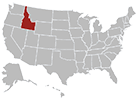
Working as Home Health Aide can be incredibly rewarding work, as well as an occupation that offers both financial stability and schedule flexibility.
If you are looking for a career in which you can make a real, genuine impact on someone’s life, while still receiving the pay and benefits to maintain a high quality of life, becoming a certified home health aide might be the job for you!
Page Navigation
- HHA Training Sites in Idaho
- Home Health Aide Salary
- Frequently Asked Questions
- Is there a fully online option for training?
- What’s the job like? Is it difficult? How’s the schedule?
- I already take care of my sick/disabled family members to the point that it takes up much of my time. Can I be considered a caregiver?
- Will there be any additional training required to begin working after I receive my HHA certification?
- What do I need to bring to training?
HHA Training Sites in Idaho
In order to become an HHA in Idaho, you will be required to complete 120 hours of training as well as 40 hours of clinical work.
There is a wide range of training sites throughout the state offering a variety of training methods as well as certifications.
Check out the list below to see what makes the most sense for you.
College of Southern Idaho

315 Falls Avenue Twin Falls, ID 83301
8-week program for $550.00
(208) 732-6701
The College of Southern Idaho exclusively offers a certified nursing assistant (CNA) program.
The course will be incredibly hands-on, placing students in a variety of real-world care environments.
Upon completion of the course and final examinations, certified CNAs will also be placed on the state’s CNA registry, opening them to a world of immediate employment opportunities.
The CNA route can also be a good decision if you are considering moving into various other healthcare professions such as being a radiology technologist or a surgical technologist.
North Idaho College Workforce Training Center
![]()
525 Clearwater Loop Post Falls, ID 83854
8-week program for $795.00
(208) 769-3444
North Idaho College Workforce Training Center is another program offering exclusively CNA training.
Unlike other programs though, NIC also offers a wide range of further training programs including Assistance with Medication training, Patient Care Technician certification, and Patient Care Coordinator training.
If you are considering becoming a CNA as a long-term career choice, and are hoping to stand out in the job hunt, certification from NIC might be a great choice.
Idaho State University

1011 North 7th Avenue Suite 202 Pocatello, ID 83209
12-week program for $600.00
(208) 282-3372
Idaho State offers CNA certification for a wide range of schedules including a 12-week daytime session, meeting 6 hours, twice a week during the day; a 14-week nighttime session: meeting 6 hours, twice a week in the evening; a 16-week web-supplemented daytime class, meeting for 6 hours skills session in person every other week while doing a majority of coursework online; as well as a 20 week, daytime session, meeting for 3 hours courses twice a week.
If you are looking for a program that offers course flexibility, this might be the one for you.
Eastern Idaho Technical College

Idaho Falls Idaho, ID 83404
8-week program for $671.00
(208) 524-3000
Eastern Idaho Technical College offers a straightforward, quality CNA training course at all three of its locations including Idaho Falls, Rexburg, and Salmon.
The course structure is an eight weeks long course combining online classes with in-person lab and clinical training.
If you are looking for an option that is at least partially remote while still getting invaluable in-person clinical experience, this might be a great option.
College of Western Idaho

5500 East Opportunity Drive Nampa, ID 83687
12-week program for $825.00
(208) 560-3000
The College of Western Idaho offers possibly the widest range of training services on our list.
These course range from additional CNA certifications such as medication management training, to one-day, certified family home medication distribution training.
If you are not exactly sure where you would like to go in the healthcare/health aide world, looking through the listings on the College of Western Idaho’s offerings would be a great place to start.
Home Health Aide Schools in Idaho – Summary Table
Top 5 Schools in Idaho
| School Name | Address |
|---|---|
| College of Southern Idaho | 315 Falls Avenue Twin Falls, ID 83301 |
| North Idaho College Workforce Training Center | 525 Clearwater Loop Post Falls, ID 83854 |
| Idaho State University | 1011 North 7th Avenue Suite 202 Pocatello, ID 83209 |
| Eastern Idaho Technical College | Idaho Falls Idaho, ID 83404 |
| College of Western Idaho | 5500 East Opportunity Drive Nampa, ID 83687 |
Home Health Aide Salary
Though it will cost some money to get trained and certified, the financial outlook to being a home health aide in Idaho is quite good.
On average, home health aides earn $34,765 in Idaho and can earn up to as much as $40,769.
This is almost five thousand more than the median average nationwide, making Idaho one of the best states to become a health aide in the county.
This isn’t to mention the additional salary benefits one might gain by obtaining additional certifications.
Annual Salary Range:Average Salary of Home Health Aides in Idaho
| City Name | Salary |
|---|---|
| Boise | $25,723 |
| Nampa | $25,446 |
| Pocatello | $25,446 |
| Idaho Falls | $25,109 |
| Meridian | $25,695 |
| Coeur d'Alene | $26,406 |
| Twin Falls | $23,920 |
| Lewiston | $27,275 |
| Caldwell | $25,419 |
| Moscow | $26,406 |
Regional Salary in Idaho
| Region | Employed | Avg. Annual Salary | Avg. Hourly Pay | Top 10% Annual Salary | Bottom 10% Annual Salary |
|---|---|---|---|---|---|
| Boise City, ID | 7,880 | $33,630 | $16.17 | $38,670 | $24,970 |
| Coeur d'Alene, ID | 1,430 | $36,040 | $17.33 | $44,190 | $28,250 |
| Idaho Falls, ID | 2,520 | $32,560 | $15.66 | $37,110 | $23,520 |
| Lewiston, ID-WA | 790 | $38,600 | $18.56 | $46,470 | $30,820 |
| Pocatello, ID | 1,080 | $32,120 | $15.44 | $36,690 | $22,980 |
| Twin Falls, ID | 1,030 | $33,160 | $15.94 | $38,310 | $25,180 |
* Employment conditions in your area may vary.
Frequently Asked Questions
Is there a fully online option for training?
In Idaho, unlike other states, online training is allowed through state-approved sites such as Home Care Pulse and Care Academy.
Clinical hours will still need to be completed in person as well as any additional specialty training, but in terms of the required course learning, you can do this fully online.
What’s the job like? Is it difficult? How’s the schedule?
Like any job, there are a number of pros and cons to becoming an HHA.
On the pro side, the job offers incredibly solid pay as well as additional benefits while still maintaining the flexibility of the schedule.
Your schedule will be determined in conversation with both what the client needs as well as what works best for you.
Because you’ll be providing care for an individual, this might mean you will have to work on holidays and weekends on occasion.
In terms of difficulty, it is hard to estimate what will be needed from you as every job can be different.
But in general, given you will be working with someone who cannot fully take care of themselves for a variety of reasons, one should expect the job to be slightly physically demanding.
You will likely be required to lift things as well as assist your client in moving about their home.
If you are someone that has issues completing this sort of thing, this is something to keep in mind.
Another difficulty you might face might be an emotional one.
HHAs will be dealing with clients who might be greatly ill or disabled and this can be difficult for every party involved.
Clients may grow short-tempered or depressed and, given sometimes you will be the only one around to talk to, this will be something you will have to learn to navigate.
Additionally, HHAs might be confronted with things that are difficult to process emotionally, such as children being greatly disabled or terminally ill.
Finally, though the intimacy of the position might bring with it certain hardship, it too can bring a lot of fulfillment.
You, in a very real way, will have the opportunity to change someone’s life while working as an HHA.
The relationships that can be born out of these circumstances can often be incredibly enriching for both you and the client.
It might be the greatest benefit of the job.
I already take care of my sick/disabled family members to the point that it takes up much of my time. Can I be considered a caregiver?
In Idaho, family members who have taken responsibility for providing care to their sick or disabled family members may be eligible for compensation for their duties.
In order to qualify, both you and your family member must meet a number of criteria, which can be found here: https://idahocaregiveralliance.com/for-the-caregiver/ After qualifying, getting HHA certification will still be required.
But if you are already spending much of your time caring for someone, this might be a viable option.
Will there be any additional training required to begin working after I receive my HHA certification?
Once certified you will be able to begin working, but, depending on your agency or client, you may have to gain additional training and certification.
For example, in the state of Idaho, anyone who is placed in charge of administering medication must have a special endorsement to do so, provided to them by the Idaho Board of Nursing.
What do I need to bring to training?
Every training site is slightly different in its requirements but, in general, one should expect to provide the following upon entering a training site:
- Valid state ID
- Social security card
- Covid vaccination record\
- Drug test
- A TB test
Many training programs will also require a background check.




